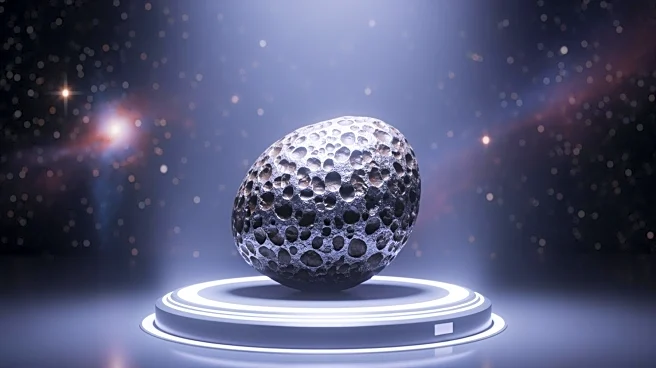What's Happening?
Researchers have identified potential evidence of material from the 'proto-Earth,' a primordial version of our planet, buried deep within Earth's rocks. This discovery was made by analyzing potassium isotopes
in ancient rock samples from Greenland, Canada, and Hawaii. The study, published in Nature Geoscience, suggests that these chemical clues have survived unaltered for billions of years, offering insights into Earth's original building blocks. The proto-Earth existed before a massive moon-forming impact reshaped it, and the findings provide a rare glimpse into the planet's earliest eras. The research team, led by Nicole Nie from MIT, found a subtle imbalance in potassium isotopes, specifically a deficit of potassium-40, which they argue is a fingerprint of material from the proto-Earth.
Why It's Important?
This discovery is significant as it provides a window into Earth's original composition and the early solar system's dynamics. Understanding the proto-Earth's material can offer clues about the formation and evolution of Earth and its neighboring planets. The findings challenge previous assumptions that the giant impact erased all chemical traces of the proto-Earth. This research could lead to a reevaluation of Earth's formation theories and enhance our understanding of planetary science. It also highlights the need for further exploration of Earth's deep geological history to uncover more about its primordial state.
What's Next?
The research team plans to continue investigating Earth's oldest rocks to find more evidence of the proto-Earth's material. They aim to refine their methods for detecting subtle isotopic signals and explore other geological sites that might contain similar ancient materials. The study suggests that the current meteorite inventory is incomplete, indicating that more discoveries could be made about Earth's original chemical composition. Future research may involve advanced simulations and collaborations to better understand the processes that preserved these ancient materials.
Beyond the Headlines
The discovery raises questions about the completeness of our understanding of Earth's formation and the solar system's early history. It suggests that there may be undiscovered materials that contributed to Earth's original composition. This could lead to new theories about planetary formation and the role of cosmic events in shaping planets. The research also underscores the importance of interdisciplinary approaches in studying Earth's deep history, combining geology, chemistry, and planetary science.












